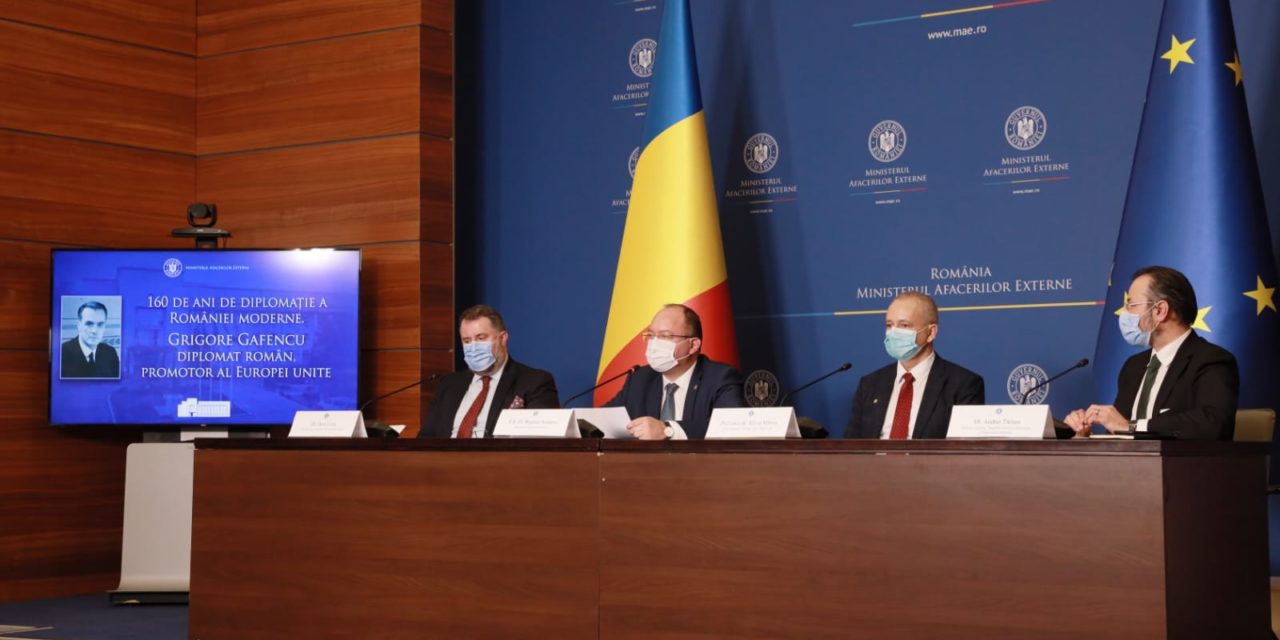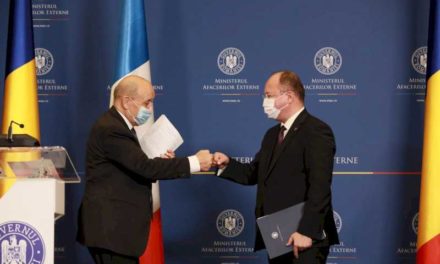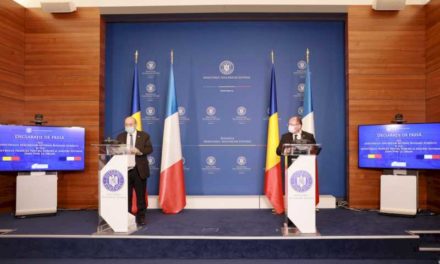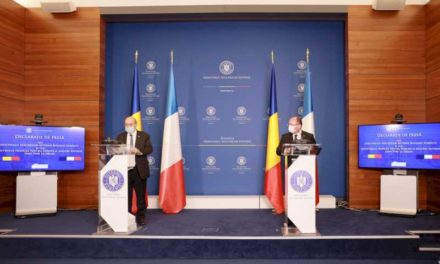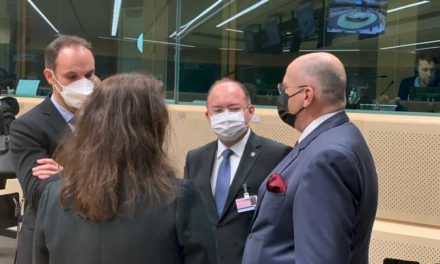Ministrul afacerilor externe Bogdan Aurescu a participat luni, 4 aprilie 2022, alături de ministrul afacerilor externe al Republicii Estonia, Eva-Maria Liimets, la o conferință organizată de think tank-ul New Strategy Center, cu tema „Agresiunea Rusiei în Ucraina. Cum putem construi un Flanc Estic al NATO mai rezilient, de la Marea Baltică la Marea Neagră?”, în contextul vizitei pe care șefa diplomației estone o efectuează la București, la invitația ministrului Bogdan Aurescu.
Conferința, desfășurată la Cercul Militar Național și moderată de dr. Antonia Colibășanu, expert asociat senior în cadrul New Strategy Center, s-a axat pe evaluarea situației generate de agresiunea ilegală a Federației Ruse în Ucraina și a situației de securitate în Vecinătatea Estică a Uniunii Europene, cu impact asupra securității statelor de pe Flancul Estic al NATO. În acest context, ministrul Bogdan Aurescu a evocat reuniunea miniștrilor de externe ai Formatului București 9 (B9), care a avut loc la Bratislava, la 31 martie 2022, în contextul continuării agresiunii armate ilegale a Rusiei în Ucraina, cu afectarea gravă a civililor și a obiectivelor civile din Ucraina, și al efectelor negative la adresa securității regionale, europene și euroatlantice, generate de invazia rusă.
De asemenea, ministrul român a subliniat importanța unității statelor NATO în gestionarea situației actuale, cu relevanță deosebită pentru securitatea europeană și euroatlantică, dar și cu proiecție asupra securității globale, condamnând în termeni fermi atât agresiunea rusă, cât și masacrul civililor de către forțele militare ruse, în zonele limitrofe ale capitalei Kiev, subliniind importanța tragerii la răspundere a celor responsabili în cadrul oferit de instanțele internaționale, în speță Curtea Penală Internațională. România s-a alăturat miercuri, 2 martie 2022, demersului comun al unor state părți la Statutul de la Roma de sesizare a Procurorului Curții Penale Internaționale cu privire la anchetarea crimelor de genocid, crimelor de război și crimelor împotriva umanității comise pe teritoriul Ucrainei, inclusiv în contextul războiului de agresiune declanșat de Federația Rusă împotriva Ucrainei.
De asemenea, ministrul Bogdan Aurescu a subliniat importanța continuării adoptării de sancțiuni împotriva Federației Ruse și de măsuri în sprijinul Ucrainei la nivelul statelor membre UE, precum și a eforturilor de întărire a posturii de descurajare și apărare pe Flancul Estic al NATO, inclusiv ca urmare a deciziilor luate la Summitul extraordinar al Alianței din 24 martie 2022. În acest sens, șeful diplomației române a subliniat importanța accelerării procesului de transformare la nivelul NATO, luând în considerare noul context de securitate.
Totodată, ministrul Bogdan Aurescu a subliniat eforturile României în sprijinul refugiaților ucraineni și necesitatea continuării acordării acestui sprijin, precum și a sprijinul acordat Republicii Moldova, evocând în acest sens Conferința ministerială de lansare a Platformei de sprijin pentru Republica Moldova, care va avea loc la 5 aprilie 2022, la Berlin, șeful diplomației române urmând să participe în calitate de co-organizator.
În încheierea dezbaterii, cei doi miniștri au împărtășit elemente legate de cooperarea bilaterală dintre România și Republica Estonia la nivel bilateral, regional, european și euroatlantic, în perspectiva consultărilor politice programate în aceeași zi.
Conferința „Agresiunea Rusiei în Ucraina. Cum putem construi un Flanc Estic al NATO mai rezilient, de la Marea Baltică la Marea Neagră?” este disponibilă în format video aici: https://www.mae.ro/node/58300.
Transmitem, mai jos, transcrierea declarațiilor introductive ale ministrului afacerilor externe Bogdan Aurescu:
Bogdan Aurescu: Thank you so much for organizing this event. I am also looking forward to our discussion today, our consultations which are long overdue because we have tried to organize your visit here, dear Eva-Maria, for quite some time, but because of objective reasons, we were unable to do it before. I am very glad that you are here and I’m very glad that Romania and Estonia are very like-minded countries and we have the same values and the same interests, both within the EU and within NATO, and we are working together very, very closely.
Last week, we have met in Bratislava for the B9 Format and we have already discussed about all these matters in detail, in a very open way. And I think, for us, it is very important that we join our forces and do our best to stop this illegal war of Russia against Ukraine. And I think this is one of the darkest moments in our recent history, not just for Ukraine, but also for our region, for the European security, for the Euro-Atlantic security. Also, this has global projections. And this aggression has shown what damage Russia is capable of inflicting to our region. We have condemned this illegal aggression from day one and, indeed, what we have seen yesterday, the images of the massacre in Bucha and other cities of Ukraine are appalling.
And let me be very clear – the Bucha massacre is the responsibility of Russia, because all these crimes were committed when this area of Ukraine was under Russian occupation. And we have to do our best to stop this illegal war against Ukraine. We have to do our best to make all those responsible for this massacre be accountable before justice. And that’s why together, both Romania and Estonia, and many other countries – I think more than 40 countries – have seized the International Criminal Court on the 2nd of March. We have asked the prosecutor of the International Criminal Court to start an investigation regarding war crimes, crimes of genocide and crimes against humanity committed on the territory of Ukraine. Unfortunately, what we have seen yesterday is only a confirmation that we were right, and it is so unfortunate that we have such a confirmation.
So, we need to continue our efforts to adopt new sanctions of the European Union, we have to continue our efforts within NATO, to consolidate our defense on the Eastern Flank, in order to create a Forward Defense Presence on the Eastern Flank. The decisions which were taken by the NATO Summit on the 24th of March were very important – the creation of four new Battle Groups, including one in Romania. This was a very important decision of the North-Atlantic Alliance, because it is balancing the presence on the Eastern Flank, it is enhancing our security. But of course it is not enough and that’s why we also welcome the decision of the NATO Summit to accelerate the process of transformation of NATO, taking into account this new reality, which is far more dangerous than before. And that’s why the military authorities of the Alliance were tasked to elaborate proposals which we are going to discuss and decide upon during the NATO Summit in Madrid, in June. This is the essence of our effort.
On refugees, of course, we have worked a lot and Romania is in the frontline of this effort, together with Poland and the other neighboring countries of Ukraine. As of yesterday, we have received in Romania more than 652,000 refugees and the effort of the Romanian authorities, together with the effort of the civil society, of the regular Romanians, was extremely complex, challenging, but, at the same time, rewarding. This is, in essence, what we have to do and we have to continue to support our partners in the region, we have to continue to support the Republic of Moldova, which is very much under the pressure of this huge wave of refugees. They have received more refugees per capita than any other countries neighboring Ukraine and facing this challenge. And this is the reason why, tomorrow, in Berlin, I will co-host together with the foreign ministers of France and Germany the Conference to support Moldova – The Moldova Support Conference – which will launch the Moldova Support Platform. The purpose of this conference is to stimulate more support, more international assistance to the Republic of Moldova in order to make the government in Chișinău be able to cope with all these challenges – the refugees, the economic situation, the energy security deficiencies.
All these are very important for Romania. I hope that we will be able to discuss more about these aspects during our debate today. Thank you.

